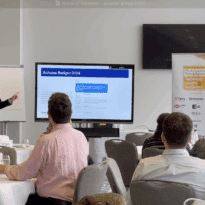Personalisation is the key for Investor Relations firms to get ready for the biggest wealth transfer in history, argue Matt Ryan, chief transformation officer at Reef, Powered by Totem.
The UK alone is expected to see £5.5 trillion of assets passed down to younger generations by 2050, which would have a significant impact on the investor relations (IR) landscape in the coming years. In fact, it will be considered the largest wealth transfer in history.
It is also predicted that roughly 90% of heirs will change their financial adviser upon wealth transfer. The IR industry must be prepared to adapt to this change in behaviour and win loyalty by a different approach: offering more personalised investment experiences. Generic communication is no longer a feasible option.
Therefore, to ensure that firms are successful in the ever-changing market they must grapple the challenges and opportunities associated with personalised IR. Many will need to implement tech enabled solutions which improves connectivity, accessibility, content delivery and giving a more curated experience to the investor.
Why personalised IR is crucial
Quality communication is crucial for managing investor perception, particularly in the digital age when younger investors have heightened expectations of how investment companies present themselves. IR firms need to understand the importance of this cohort, otherwise they’ll miss out on targeting young investors.
Gen Y and Gen Z are already seeking financial advice and may use competing IR firms that immediately meet their demands. Therefore, IR professionals can boost their profile by telling compelling corporate stories across multiple content formats and personalise their services to capture their attention and long-term interest.
Millennial and Gen Z investors are always on the lookout for new investment opportunities and are more likely to recommend services than older generations. The topic will be front and centre for many of these age groups as three quarters (73%) of young investors say they constantly pressure themselves to improve their financial situation. That’s compared to little over a quarter (28%) of Baby Boomers who feel the same.
When it comes to their perception of companies, 71% of young investors believe having a strong website is crucial, and 40% think firms should maintain a presence on social media, while just 4% of boomers agree. Therefore, being innovative online with personalised IR is important for building relationships with young investors.
Clearly, there is an abundance of information out there and the marketplace is highly competitive. Personalisation can help firms target potential investors with relevant, clear and tangible communication. For example, when millennials and Gen Z look for financial advisors, they prioritise those that take a comprehensive approach and help them navigate multiple goals. Communication, the quality of the website, and social media channels are also key factors that influence their overall decision, so IR firms must have the effective tools that help them innovate these services.
A step-by-step guide to personalising IR communication
There are several tech-enabled methods which help firms develop personalised services:
• Prioritising Accessibility
Making web content and events accessible for all stakeholders is fundamental – use the UK government’s compliance standards to guide you. The goal is to make websites and digital communications easy to use but it has the added benefit of maximising the reach as well as demonstrating a commitment to inclusivity and compliance.
• Transmitting customised messages
One-size-fits-all communication strategies are now obsolete. In the era of on-demand services, content can now be delivered to a customer based on its relevance, resonance and popularity. Firms need to diversify their content and take inspiration from media giants like Netflix and Spotify to stay competitive – microsites and engaging multimedia content are ideal for this.
They help in building a presence tailored to specific investor segments as they can offer customised content which meets their unique needs and preferences. Multimedia content, such as podcasts, videos and interactive infographics, can also innovate the storytelling aspect of corporate communications, making it more compelling and easier to understand and engage with.
• Interactive Engagement
Creating engagement with interactive features across webcasts and virtual events will empower stakeholders. That’s because digital tools including live polls, Q&A sessions, and real-time feedback can improve the experience and provide valuable insights into investor preferences and concerns.
AI-powered chatbots can also offer 24/7 client support as they address investor queries promptly and efficiently, further personalising the investor experience.
Setting the gold standard for digital client engagement
There are many useful digital tools that audience engagement platforms on the market today can use to carry out these strategies. By streamlining the creation and delivery of personalised IT experiences, firms can offer flexible multimedia management that complies with the latest accessibility standards. This means that investment firms can deliver tailored, accessible, and engaging content to their investors, enhancing their overall experience and satisfaction.
It’s also important to offer a single access point to a diverse range of digital content such as on-demand videos, articles, and podcasts to live experiences like webinars, AGMs and investor meetings. This allows firms to create digital experiences that match the quality of prestige in-person interactions and services.
Unlocking the advantages
Both the investor landscape and digital services are evolving at pace, so firms should embrace transformation and personalised-led strategy to unlock:
- Customised content: This strengthens client relationships and enables brands to target a broader range of segments, resulting in higher engagement metrics.
- Improved brand perception: Putting a compelling and consistent brand message across all channels strengthens your brand message and helps you build trust and loyalty.
- Empower data-driven decision-making: Harnessing data insights helps IR personalise and improve the effectiveness of their communications. It also saves time and resources when creating and managing digital strategies.
With this personalised approach to IR, firms can successfully engage with young investors and make themselves more competitive in an increasingly complex digital-first market.






























